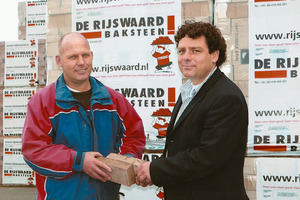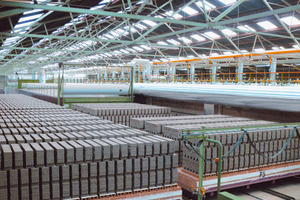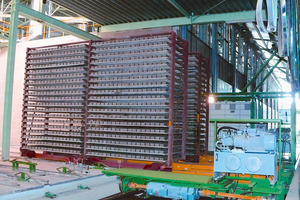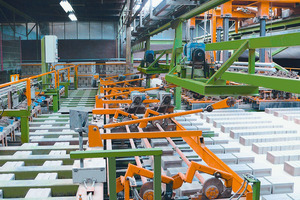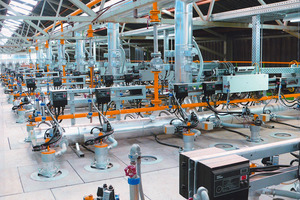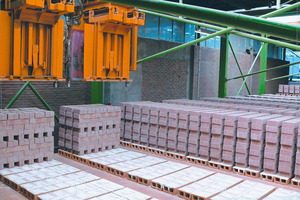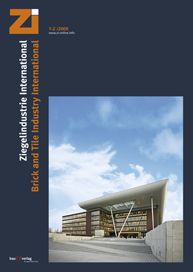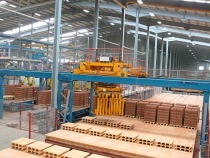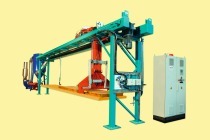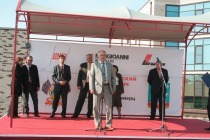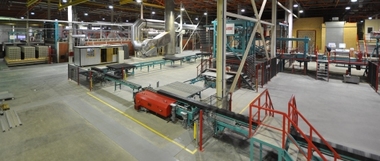Lingl technology raises annual output from 110 to 142 million WF units
With the extension of the De Rijswaard brick plant in Aalst, the machinery and plant supplier Lingl from Krumbach has realised a showcase project which meets with great interest in the Dutch brick industry. Not long after the completion of the plant extension the Association of Experts of the Ceramic Industry in Belgium and the Netherlands held a meeting and inspected the new systems in the De Rijswaard plant. The owner Atze Blei expressed his high appreciation for the Lingl performance. “The top quality of our products complies with the engineering excellence Lingl showed in the extension of our plant.“
De Rijswaard is one of the brick plants in the Netherlands producing soft mud facing bricks. The raw material comes from the delta of the rivers Rhine, Maas and Waal. The production schedule is not based on individual orders but production is run continuously in accordance with the company’s own market analysis.
De Rijswaard and Lingl benefit from a long-standing partnership which already had been cultivated by the father of the present owner Atze Blei. In 2000 one of the biggest setting machines in the Dutch brick industry with impressive performance data was installed for De Rijswaard by Lingl. Together the two production lines reach a capacity of 44 550 bricks per hour; each kiln car holds 28 560 products.
At the end of 2006 the De Rijswaard management had first discussions with Lingl regarding a significant extension of the plant. In October 2007 the contract was signed by both parties. One of the most important components of the order is the Simatic S7 control which allows the fully automatic product tracking from the press up to the transport pack. Production data such as time, quantity and charge can be recalled at the push of a button at any time. The complete capacity of the transport installation had to be increased; in addition the dryer was modified and the tunnel kiln was extended to 210 m. The construction in the Lingl process engineering department only lasted from February until construction approval in May 2008.
Without stopping production the kiln building was elongated, the kiln extension was completed, the dryer building was roofed over and the foundations for the new dryer transfer car were cast. Only between the 1st and 31st August the kiln remained cold and production was stopped. During these few weeks the kiln was given a new roof and the internal walls were completely renewed. The existing kiln and the kiln extension were connected and the complete kiln was newly equipped with the firing installations, pipe work and fans. In addition, during the production stop the kiln and the kiln car circulation system had to the readjusted. Lingl displaced the shunting car and the kiln exit transfer car, adapted all transport means to the kiln cars, installed a new dryer transfer car and interconnected the 56 m long (!) chambers of the existing double chamber dryer which was newly equipped with rotary fans, burners and pipe work.
After the 1st September – exactly within the time schedule – Lingl gradually increased the kiln car pushing rate to the full capacity of 15 tunnel kiln cars per day, before completing the individual assembly sections, including the safety arrangements. Between the 4th and 11th December the energy consumption, the output as well as the quality of the products were tested by the Lingl team in extensive performance tests. As all the values met the De Rijswaard requirements, the plant extension could be completed by Lingl within the planned construction period, last but not least due to the trouble-free team work with the local companies and the cooperative support by De Rijswaard.
“That we are able to increase our output from 110 to 142 million bricks per year is to be attributed to the perfect performance of Lingl“, said Atze Blei. “We could always rely on Lingl keeping all the delivery times and schedules. Therefore we decided to place this order for the plant extension with our long-time partner Lingl again.“

